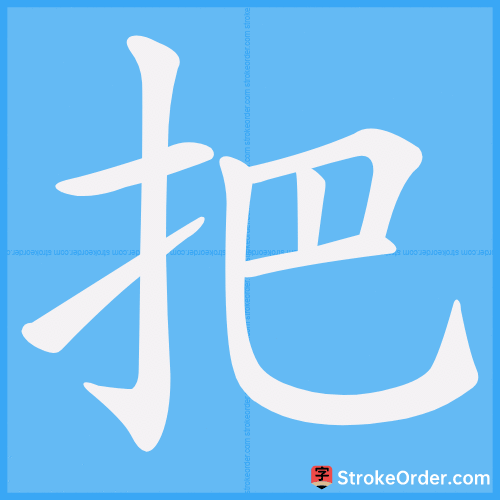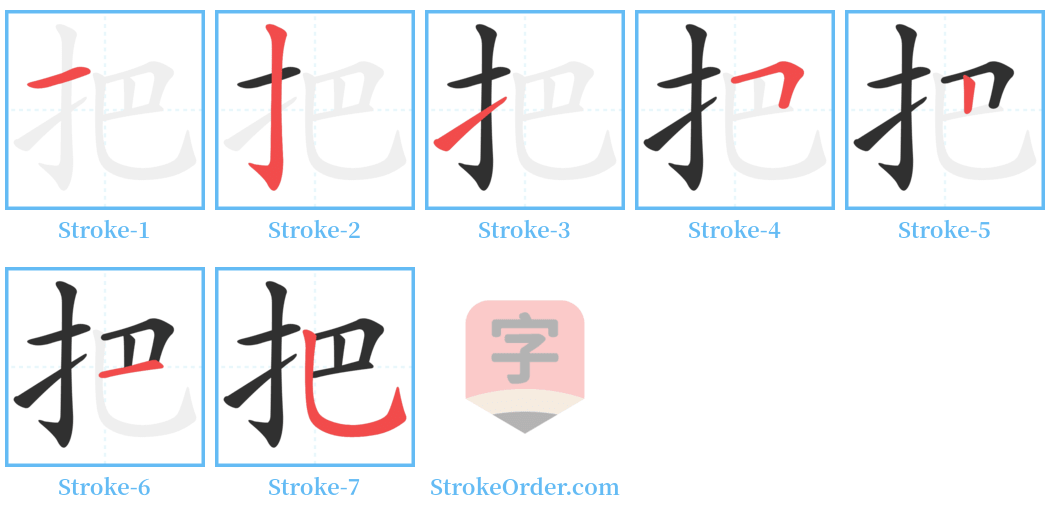把 Stroke Order
Animated Stroke Order of 把

Stroke Order Diagrams for 把

Step-by-Step Handwriting Guide for 把

Learn to Write Chinese Characters with Video Tutorials
Watch the video of writing the Chinese character "把", learn the correct stroke order (笔顺) of the character "把", and master the standard way of writing the character "把".
Free Printable Handwriting Practice with Stroke Order: 把
Printable Writing Practice Worksheet of "把" in Portrait Orientation (Tian Zi Ge)

Printable Writing Practice Worksheet of "把" in Landscape Orientation (Tian Zi Ge)

Information of 把
Pinyin
bǎ、 bà
Radical
扌
Strokes
7 strokes
Usage
★★★★★
Definition
(a measure word) / (marker for direct-object) / to hold / to contain / to grasp / to take hold of, handle
把 [bǎ]
动词 (verb)
1. 拿,抓住: to hold; to grasp.
2. 控制,掌握: to control; to master.
3. 看守: to guard; to watch.
4. 给: to give.
5. 按,诊: to feel (for a pulse).
名词 (noun)
1. 把东西扎在一起的小捆儿: a small bundle of things.
2. 把手: handle; grip.
3. 把式: a person skilled in a trade.
形容词 (adjective)
1. 大约: about (used after a numeral or measure word to indicate approximate quantity).
2. 朋友结为异姓兄弟等关系的: sworn (referring to sworn brotherhood or similar relationships).
介词 (preposition)
1. 用在直接宾语之前,宾语之后跟着及物动词: used before a direct object, followed by a transitive verb.
2. 表示处置: indicating disposal.
3. 表示致使: indicating effect.
4. 表示动作行为的结果: indicating the result of an action.
5. 引进凭借的工具、材料、方法等: equivalent to "with"; introducing tools, materials, methods, etc.
6. (方言)用在动词后,表示交与、付出,相当于“给”: to indicate giving ("to").
7. 引进对象,相当于“对”: introducing an object, equivalent to "to".
8. 表示经过,用在处所词前面,相当于“从”: indicating 'from'.
9. 在被动式里引进行为的主动者,相当于“被”: indicating 'by' in a passive construction.
量词 (measure word)
1. 用于有柄的器具: used for tools with handles.
2. 指一手抓起的数量: referring to the quantity that can be grasped with one hand.
3. 一握或一小捆: a handful or a small bundle.
4. 用于某些抽象的事物: used for certain abstract things.
5. 用于手的动作: used for hand actions.
名词 (noun - additional meanings)
1. 柄: the part of an object that can be conveniently grasped by hand.
2. 植物上支持着一个或多个叶片、花朵或果实的部分: the part of a plant that supports one or more leaves, flowers, or fruits.
3. 用于拉或操纵的器件: a device used for pulling or manipulating (e.g., opening, closing, lifting).
4. 另见 bǎ: see also bǎ.
物体上便于手拿的部分: the part of an object that is convenient to hold.
被人作为说笑资料的言行: words or actions used as materials for jokes.
Input Method for 把
Pinyin
ba3
Wubi
rcn
Cangjie
qau
Zhengma
dyia
Four Corner
57017
Unicode
U+628a
Same Pronunciation Characters